|
|
|
Sort Order |
|
|
|
Items / Page
|
|
|
|
|
|
|
| Srl | Item |
| 1 |
ID:
098750
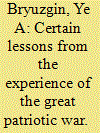

|
|
|
| 2 |
ID:
143686
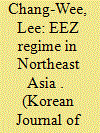

|
|
|
|
|
| Summary/Abstract |
One of the most controversial issues during the UN Conference on the Law of the
Sea was to determine the legal status of the EEZ. The first view envisaged the
zone as an extension of the territorial sea, where the coastal states would enjoy
sovereignty with certain exceptions. The second view considered the zone to have
the high seas status with certain modifications. The third view held that the EEZ
was a sui generis zone with its own legal status. The first view was presented
by several Latin American states. The second view reflected the concerns of
Maritime Powers.
|
|
|
|
|
|
|
|
|
|
|
|
|
|
|
|
| 3 |
ID:
132565
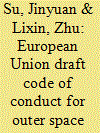

|
|
|
|
|
| Publication |
2014.
|
| Summary/Abstract |
The European Union draft Code of Conduct for outer space activities is one of the primary international initiatives, that are currently active, to enhance the safety, security and sustainability of outer space activities. Although the spirit underlying the instrument is commonly shared by space-faring countries, substantial disagreement exists among States as to some of its core provisions. This article proposes that the Code of Conduct should make a clear distinction between commercial activities and military activities, and adopt more balanced measures on the restriction of military activities in outer space.
|
|
|
|
|
|
|
|
|
|
|
|
|
|
|
|
| 4 |
ID:
097042
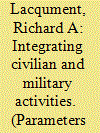

|
|
|
| 5 |
ID:
122672
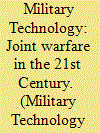

|
|
|
|
|
| Publication |
2012.
|
| Summary/Abstract |
The document "Capstone Concept
for Joint Operations" describes in
broad terms the vision of the then
Chairman of the Joint Chiefs of
Staff, Adm. Michael G. Mullen for
how the joint force circa 2016-2028
will operate in response to a wide
variety of security challenges. It
proposes that future joint force
commanders will combine and
subsequently adapt some combi-
nation of four basic categories of
military activity - combat, security,
engagement, and relief and recon-
struction - in accordance with the
unique requirements of each oper-
ational situation. The concept is
informed by last years, still current,
strategic guidance, but because it
looks to the future, it is intended to
be adaptable to changes in that
guidance.
|
|
|
|
|
|
|
|
|
|
|
|
|
|
|
|
| 6 |
ID:
141483
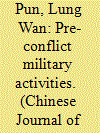

|
|
|
|
|
| Summary/Abstract |
Much study has focussed upon the legality of, as well as justifications for, military activities of States causing environmental damage in times of armed conflict, with particular reference to norms of international humanitarian law. However, in preparation for potential armed conflict, such military activities may also take place before the commencement of any such armed conflict. This paper seeks to explore the environmental protection obligations of States under international law in their conduct of military activities in anticipation of armed conflict. On the one hand, peacetime obligations entailing environmental protection, which may be derived not only from international environmental law but also other fields such as international human rights law and international investment law, would generally apply during the pre-conflict stage. On the other hand, it is also observed that there may be legal justifications for deviation from such obligations in particular circumstances in connection with the pre-conflict situation, for instance, by reliance upon exception clauses within the relevant treaties, suspension of primary obligations due to circumstances such as the needs of national security, as well as invocation of circumstances precluding wrongfulness under the law of State responsibility.
|
|
|
|
|
|
|
|
|
|
|
|
|
|
|
|
| 7 |
ID:
094105
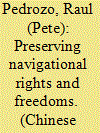

|
|
|
|
|
| Publication |
2010.
|
| Summary/Abstract |
China's views on coastal State authority in the exclusive economic zone (EEZ) are not supported by State practice, the negotiating history of the United Nations Convention on the Law of the Sea (UNCLOS), or a plain reading of Part V of the Convention. All nations may legitimately engage in military activities in foreign EEZs without prior notice to, or consent of, the coastal State concerned. Efforts were made during the negotiations of UNCLOS to broaden coastal State rights and jurisdiction in the EEZ to include security interests. However, the Conference rejected these efforts and the final text of the Convention (Article 58) ultimately preserved high seas freedoms of navigation and overflight and other internationally lawful uses of the seas related to those freedoms, to include military activities, in the EEZ.
|
|
|
|
|
|
|
|
|
|
|
|
|
|
|
|
| 8 |
ID:
137617
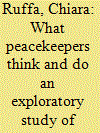

|
|
|
|
|
| Summary/Abstract |
This exploratory article points out how armies differ in the performance of their daily military activities during a peacekeeping mission and analyses the role of contrasting perceptions of the mission operational environment in explaining this variation. As a first step, this article documents systematic variations in the way French, Ghanaian, Italian, and Korean units implement the mandate of the UN mission in Lebanon in their daily military activity. Second, it shows that the four armies also interpret or “construct” the operational environment differently and in a way that is consistent with their different military behavior. Third, preliminary evidence suggests that previous experiences of each army influence the way in which the operational environment is constructed. Data were collected combining participant observation in Southern Lebanon with questionnaires and interviews. This article thus builds on sociological works on different operational styles but takes a methodological approach closer to that in security studies.
|
|
|
|
|
|
|
|
|
|
|
|
|
|
|
|
|
|
|
|
|